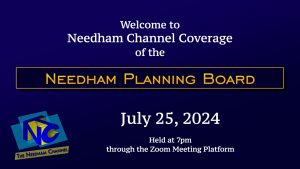February 16, 2023
The co-chairs of the Housing Plan Working Group spoke with us about the plan to comply with a new Massachusetts law requiring multi-family zoning districts near public transit hubs. In this installment, they tell us about the reasons behind the suggested changes and the impacts they hope to see as a result.
reported by Yuxiao Yuan
The town of Needham submitted its action plan for the MBTA communities by the January 31st deadline. The submission puts the town in temporary compliance with a new state law that requires communities near transit hubs to craft multi-family zoning districts or risk losing certain state funds. Town officials see Needham’s compliance as a critical aspect of the town’s long-term housing plan, a hundreds page document that outlines steps to address the town’s unmet housing needs.In this report, we will focus on how Needham might change under the MBTA’s Community’s Rezoning Strategy, and what the next steps are. The new law aims to clear the zoning barriers for multi-family housing as a way to address the housing crisis across the Commonwealth. Based on the town’s current developable land and housing stock, Needham needs to establish zoning districts that can provide opportunities for at least 1,784 multi-family units, and 90% of those units must be within a half mile of a commuter rail station. The submission of an action plan only requires local officials to outline the potential zoning changes the town may have to adopt in order to comply. Needham’s rezoning strategy is largely focused on areas along the Highland Avenue to Chestnut Street corridor, which are not only near transit, but also have higher density development already. “Most of that zoning already worked except for some pockets,” shared Housing Plan Working Group co-chair Natasha Espada. “That’s the opportunity… figuring out what tweaks needed to be made, to make it contiguous, to make it meet all the requirements.” Town planners recommend using the existing ‘Apartment A-1’ district as a dimensional template for Multi-Family Zoning. Some of these are already located within the half mile radius, such as Rosemary Ridge, the Highlands, the Hamilton Highlands (formerly known as Webster Green). “It fit the requirements of the MBTA Communities Act perfectly.” said Jeanne McKnight, the housing group’s other co-chair. “They require at least 15 units per acre. [Apartment A-1 zoning] allows 18 units per acre. Obviously if we chose to create a new zone with a higher density, then we wouldn’t have to rezone as many acres. I guess people, somebody would refer to it as a suburban density more than an urban density.” One of the rezoning strategies is to convert areas that are not currently zoned for multi-families to Apartment A-1 zoning. For example, multi-family zoning will be extended on both sides of Highland Avenue from Hamilton Highlands and Avery School condominium to Hunnewell Street. Also, parcels around Greene’s Field near the commercial area will be zoned for multifamily where there are existing buildings, including the Stephen Palmer building, YMCA, the former Hillcrest Gardens and the two churches on Great Plain Avenue. Another change will apply to some of the commercial districts where mixed use development is allowed by right and the industrial districts. The rezoning will add by right standalone multi-families and will increase the height limit for mixed use development in some areas. A mixed use development typically has retail and restaurants on the first floor and residential units on the upper floors. This modification will affect areas such as space from Sudbury Farms to Eaton Funeral Home and on Chestnut Street from near the police station to the railroad bridge. However, in the downtown area, Needham planning leaders do not want to include standalone multi-families. Says McKnight, “Because our view or vision for that area is the side sidewalk frontage of retail restaurants, shops of various kinds. That’s what we want for our downtown. We don’t want standalone multi-family housing in that particular location.” The compliant communities must adopt the zoning changes by the end of 2024. But it’s hard to predict how much housing the new regulation will generate. As Espada puts it, “We know what the zoning allows, but we don’t know what the developers will propose.” It is also uncertain what the effect will be on traffic infrastructure and the school enrollment. The Planning Board will have the power to modify development proposals through due process. Says Espada,”What we determined is that every project will need a traffic study. Every project will need to review the capacity of the town for that particular project. Whenever there is a proposal, we need to have a comprehensive assessment of it and the impacts to the town.” “Just because these developments are by right does not mean that the Planning Board has no say,” agreed McKnight. “The state law allows site plan review and in site plan review we can address all of these kinds of issues.” As a matter of fact, town planners are working on how to attract developers to create housing. According to McKnight, there have not been many proposals after Needham passed the zoning amendment in 2009, allowing mixed use development in the downtown area and along Chestnut Street. “We’ve only had two projects, one on Dedham Avenue across from the Unitarian Church, and more recently a smaller project on Oak Street. That may be something to study. Is there something about our zoning that is discouraging development?” The town recently kicked off a parking study to reexamine parking needs in Needham Heights and Needham Center. If Needham can reduce the parking requirement to some extent, it may incentivize developers by lowering the development costs.” Natasha Espada suggested,”Looking at the parking study, what actually is the reality–with a hybrid situation and opportunities for the MBTA communities where people take public transportation–all of that put together, we will have a different result than what we currently have.” There will be three community meetings in the near future to gather public feedback on the MBTA community’s action plan.
The co-chairs of the Housing Plan Working Group spoke with us about the plan to comply with a new Massachusetts law requiring multi-family zoning districts near public transit hubs. In this installment, they tell us about the reasons behind the suggested changes and the impacts they hope to see as a result.
The town of Needham submitted its action plan for the MBTA communities by the January 31st deadline. The submission puts the town in temporary compliance with a new state law that requires communities near transit hubs to craft multi-family zoning districts or risk losing certain state funds. Town officials see Needham’s compliance as a critical aspect of the town’s long-term housing plan, a hundreds page document that outlines steps to address the town’s unmet housing needs.In this report, we will focus on how Needham might change under the MBTA’s Community’s Rezoning Strategy, and what the next steps are. The new law aims to clear the zoning barriers for multi-family housing as a way to address the housing crisis across the Commonwealth. Based on the town’s current developable land and housing stock, Needham needs to establish zoning districts that can provide opportunities for at least 1,784 multi-family units, and 90% of those units must be within a half mile of a commuter rail station. The submission of an action plan only requires local officials to outline the potential zoning changes the town may have to adopt in order to comply. Needham’s rezoning strategy is largely focused on areas along the Highland Avenue to Chestnut Street corridor, which are not only near transit, but also have higher density development already. “Most of that zoning already worked except for some pockets,” shared Housing Plan Working Group co-chair Natasha Espada. “That’s the opportunity… figuring out what tweaks needed to be made, to make it contiguous, to make it meet all the requirements.” Town planners recommend using the existing ‘Apartment A-1’ district as a dimensional template for Multi-Family Zoning. Some of these are already located within the half mile radius, such as Rosemary Ridge, the Highlands, the Hamilton Highlands (formerly known as Webster Green). “It fit the requirements of the MBTA Communities Act perfectly.” said Jeanne McKnight, the housing group’s other co-chair. “They require at least 15 units per acre. [Apartment A-1 zoning] allows 18 units per acre. Obviously if we chose to create a new zone with a higher density, then we wouldn’t have to rezone as many acres. I guess people, somebody would refer to it as a suburban density more than an urban density.” One of the rezoning strategies is to convert areas that are not currently zoned for multi-families to Apartment A-1 zoning. For example, multi-family zoning will be extended on both sides of Highland Avenue from Hamilton Highlands and Avery School condominium to Hunnewell Street. Also, parcels around Greene’s Field near the commercial area will be zoned for multifamily where there are existing buildings, including the Stephen Palmer building, YMCA, the former Hillcrest Gardens and the two churches on Great Plain Avenue. Another change will apply to some of the commercial districts where mixed use development is allowed by right and the industrial districts. The rezoning will add by right standalone multi-families and will increase the height limit for mixed use development in some areas. A mixed use development typically has retail and restaurants on the first floor and residential units on the upper floors. This modification will affect areas such as space from Sudbury Farms to Eaton Funeral Home and on Chestnut Street from near the police station to the railroad bridge. However, in the downtown area, Needham planning leaders do not want to include standalone multi-families. Says McKnight, “Because our view or vision for that area is the side sidewalk frontage of retail restaurants, shops of various kinds. That’s what we want for our downtown. We don’t want standalone multi-family housing in that particular location.” The compliant communities must adopt the zoning changes by the end of 2024. But it’s hard to predict how much housing the new regulation will generate. As Espada puts it, “We know what the zoning allows, but we don’t know what the developers will propose.” It is also uncertain what the effect will be on traffic infrastructure and the school enrollment. The Planning Board will have the power to modify development proposals through due process. Says Espada,”What we determined is that every project will need a traffic study. Every project will need to review the capacity of the town for that particular project. Whenever there is a proposal, we need to have a comprehensive assessment of it and the impacts to the town.” “Just because these developments are by right does not mean that the Planning Board has no say,” agreed McKnight. “The state law allows site plan review and in site plan review we can address all of these kinds of issues.” As a matter of fact, town planners are working on how to attract developers to create housing. According to McKnight, there have not been many proposals after Needham passed the zoning amendment in 2009, allowing mixed use development in the downtown area and along Chestnut Street. “We’ve only had two projects, one on Dedham Avenue across from the Unitarian Church, and more recently a smaller project on Oak Street. That may be something to study. Is there something about our zoning that is discouraging development?” The town recently kicked off a parking study to reexamine parking needs in Needham Heights and Needham Center. If Needham can reduce the parking requirement to some extent, it may incentivize developers by lowering the development costs.” Natasha Espada suggested,”Looking at the parking study, what actually is the reality–with a hybrid situation and opportunities for the MBTA communities where people take public transportation–all of that put together, we will have a different result than what we currently have.” There will be three community meetings in the near future to gather public feedback on the MBTA community’s action plan.











More Stories
Clean-Up Costs Town Time and Money at Rosemary
Needham Rocks All-Scholastics
Emery Grover Construction Progresses